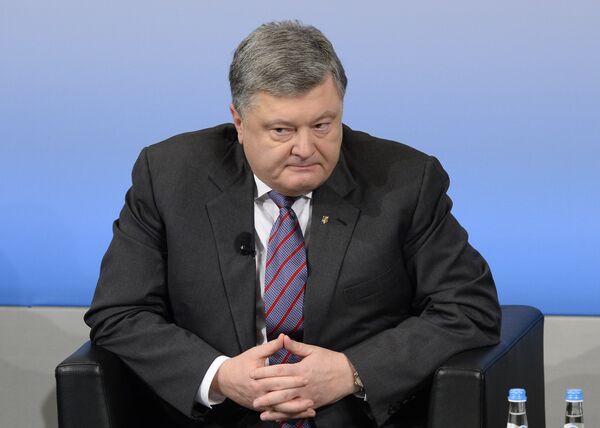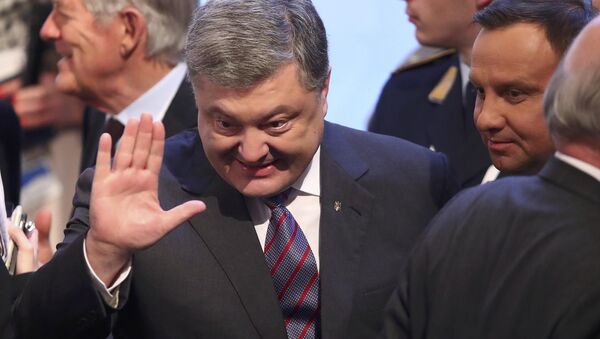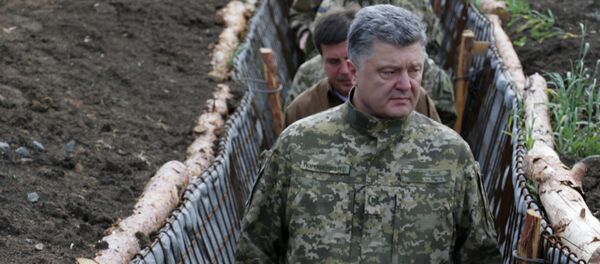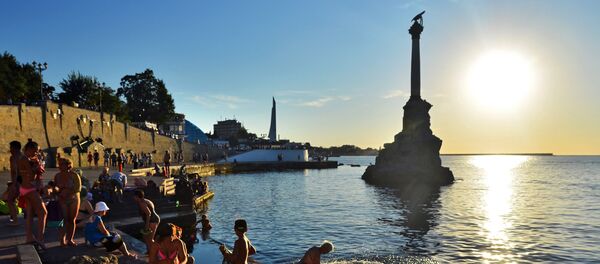Last week, the Ukrainian president made a speech at the Munich Security Conference, warning against "obsessive calls" by some Western leaders to "appease" Russia. Unfortunately for Poroshenko, Russian observers monitoring the conference pointed out that his speech aside, most conference attendees only mentioned Russia in passing, if at all, and balanced any grievances with statements about readiness for dialogue.
On Wednesday, Poroshenko spoke with US Congressman Mike Quigley and Senator Richard Durbin. Among other things, the officials discussed the need to intensify sanctions against Russia. Quigley claimed that the Trump administration's musings about lifting sanctions was "dangerous, misguided, and damages US global credibility…shortsightedly eliminat[ing] any leverage we have on the Kremlin."

A day earlier, Poroshenko met with Christos Styliandes, European Commissioner for Humanitarian Aid and Crisis Management in Kiev, telling him as well that sanctions must be strengthened. The president insisted that Russia's recent decision to recognize ID documents from the self-proclaimed Donetsk and Lugansk People's Republics was a "gross violation" of the Minsk Agreements, and needed to be penalized.
Commenting on the Ukrainian president's increasingly desperate efforts to pressure his Western partners, Ukrainian political observer and RIA Novosti contributor Rostislav Ishchenko wrote that frankly, he had his doubts about "whether Kiev even believes in the possibility of actually increasing sanctions pressure on Russia." In the same way, the expert noted, "it's unlikely that authorities in Kiev still believe in European investments coming to Ukraine, or that they will actually get assistance from the IMF. They just have to at least promise Ukrainians some kind of 'bright future.'"
Similarly, Ishchenko added, sanctions are a good talking point for Ukrainian officials. After all, he wrote, "during negotiations, in the space between greetings and farewells, it's necessary to actually say something. And what else if not sanctions, or aid money, can Ukrainian representatives talk about? They have nothing to sell. They have no money to buy anything. The EU and NATO haven't taken them in, they haven't granted them visa-free travel. Meanwhile, the anti-Russian sanctions, although they are not being tightened, at least actually exist."
But in practice things are much more complicated, the analyst explained. "The objective of sanctions is to destabilize the economic situation in the target country, either forcing its leaders to capitulate to the West and unconditionally accept its demands, or create the conditions for an invasion or an internal coup."
"If it becomes clear that these goals are unattainable, the West begins looking for opportunities to roll sanctions back. This is what happened with Iran, and with China," Ishchenko stressed. "Now, the same thing is happening with anti-Russian sanctions," he added.
"Both Washington and Brussels now understand that instead of destroying the Russian economy and financial system, instead of leading to the destabilization of its social sphere, sanctions have lead only to a sharp consolidation of Russian society, and accelerated the elimination of financial and economic dependence on the Western system."
Therefore, the analyst noted, the "task faced by the West now is not to strengthen sanctions, but to try to end the sanctions regime while saving face."
"On the other hand, if they wait too long, Washington and Brussels may be struck with an even more complicated situation: there's no telling what other moves Moscow might make to try and force Kiev to make peace in the Donbass."
Therefore, Ishchenko noted, Poroshenko's hopes and dreams notwithstanding, the US and the EU are now each trying to push each other to be the first to lift sanctions against Russia.
"If the EU lifts sanctions first, Washington can say that its allies have 'betrayed the cause of democracy', and that the US need not suffer alone," he wrote. "If the US lifts sanctions first, the EU can point 'to the example of the leader of the free world'. And so it seems that this jogging in place will persist for some time."
In other words, according to Ishchenko, Poroshenko has completely lost the plot on the sanctions issue. Instead of strengthening them, Western leaders are now scratching their heads looking for ways to abandon them. Finally, it certainly doesn't help the Ukrainian president's case that his pretext for tougher sanctions – the Russian recognition of Donbass republic ID documents, is a non-starter from a legal standpoint.




